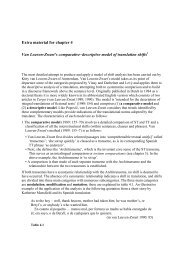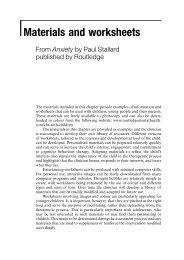Politics and International Relations 2011 (UK) - Routledge
Politics and International Relations 2011 (UK) - Routledge
Politics and International Relations 2011 (UK) - Routledge
Create successful ePaper yourself
Turn your PDF publications into a flip-book with our unique Google optimized e-Paper software.
86<br />
Public Policy<br />
ForthcomiNg<br />
Social democracy<br />
A Comparative Account of the Left Wing<br />
Party Family<br />
Hans Keman, Vrije University, Amsterdam, the<br />
Netherl<strong>and</strong>s<br />
This book focuses on social democracy as a party <strong>and</strong> a<br />
broad movement as well as a unique political force in<br />
the industrialised world. It provides a critical comparative<br />
survey of when, where, how <strong>and</strong> why social democracy<br />
developed within established capitalist democracies.<br />
It explains the electoral successes <strong>and</strong> failures of social<br />
democratic parties, the influence of the party system <strong>and</strong><br />
the nature of competition <strong>and</strong> co-operation between<br />
parties. It also examines the ideological tensions within<br />
social democratic parties between socialists <strong>and</strong><br />
reformists.<br />
It features a broad range of case studies including<br />
Australia, Austria Belgium, Denmark, Finl<strong>and</strong>, France,<br />
Greece, Germany, Italy, Luxembourg, Netherl<strong>and</strong>s, New<br />
Zeal<strong>and</strong>, Norway, Portugal, Spain, Sweden, Switzerl<strong>and</strong>,<br />
United Kingdom as well as comparisons with the United<br />
States, Canada <strong>and</strong> Japan.<br />
August <strong>2011</strong>: 234 x 156: 208pp<br />
Hb: 978-0-415-57406-8: £80.00<br />
Pb: 978-0-415-57407-5: £26.99<br />
For more information, visit:<br />
www.routledge.com/9780415574075<br />
New<br />
Cities, <strong>Politics</strong> & Power<br />
Simon Parker, University of York, <strong>UK</strong><br />
Series: <strong>Routledge</strong> Critical Introductions to Urbanism<br />
<strong>and</strong> the City<br />
Cities, <strong>Politics</strong> <strong>and</strong> Power<br />
combines a traditional concern<br />
with how the cities in which we<br />
live are organised <strong>and</strong> run with<br />
a broader focus on cities <strong>and</strong><br />
urban regions as multiple sites<br />
<strong>and</strong> agents of power.<br />
Selected Contents:<br />
Part 1: 1. Introduction<br />
Part 2: The Political Life of<br />
Cities 2. The Civic City: The<br />
Emergence of Urban Societies<br />
3. The Uncivil City: Violence,<br />
Conflict <strong>and</strong> Resistance Part 3: urban Governance<br />
4. Political Organisations <strong>and</strong> the Quest for Urban Power<br />
5. The Government of Cities 6. The Confines of Power:<br />
Cities, Regions <strong>and</strong> States in a Global Perspective<br />
Part 4: Identity, Communication <strong>and</strong> Space 7. The<br />
<strong>Politics</strong> of Urban Identity 8. Information, Communication<br />
<strong>and</strong> the Networks of Urban Power 9. The L<strong>and</strong>scapes of<br />
Urban Power Part 5: Conclusion 10. Power <strong>and</strong> <strong>Politics</strong> in<br />
the City<br />
November 2010: 234 x 156: 224pp<br />
Hb: 978-0-415-36579-6: £65.00<br />
Pb: 978-0-415-36580-2: £21.99<br />
eBook: 978-0-203-01828-6<br />
For more information, visit:<br />
www.routledge.com/9780415365802<br />
Evidence-Based<br />
Policymaking<br />
Insights from Policy-Minded Researchers<br />
<strong>and</strong> Research-Minded Policymakers<br />
Karen Bogenschneider <strong>and</strong> Thomas J. Corbett,<br />
both at University of Wisconsin–Madison, USA<br />
This book examines ways to<br />
enhance evidence-based<br />
policymaking, striking a balance<br />
between theory <strong>and</strong> practice.<br />
The attention to theory builds a<br />
greater underst<strong>and</strong>ing of why<br />
miscommunication <strong>and</strong> mistrust<br />
occur. Until we better<br />
appreciate the forces that divide<br />
researchers <strong>and</strong> policymakers,<br />
we cannot effectively construct<br />
strategies for bringing them<br />
together.<br />
Selected Contents: 1. Exploring the Disconnect Between<br />
Research <strong>and</strong> Policy 2. Do Policymakers Want Evidence?<br />
Insights from Research-Minded Policymakers 3. When<br />
Researchers Delivered Evidence to Policymakers 4. Who are<br />
These Knowledge Producers <strong>and</strong> Knowledge Consumers<br />
Anyway? 5. Why Research is Underutilized in Policymaking:<br />
Community Dissonance Theory 6. Breaking Through<br />
Stereotypes of Policymakers 7. What Knowledge Producers<br />
Should Know About the Policymaking Process 8. Barriers to<br />
<strong>and</strong> Rewards of Cross-Cultural Communication<br />
9. Communicating With Policymakers: Insights from<br />
Policy-Minded Researchers 10. Approaching Policymakers:<br />
Moving Beyond ’What’ to ’How’ 11. Generating Evidence<br />
on Disseminating Evidence to Policymakers 12. Where Do<br />
We Go from Here? Appendix: Methodological Notes.<br />
References<br />
April 2010: 229 x 152: 368pp<br />
Hb: 978-0-415-80583-4: £64.95<br />
Pb: 978-0-415-80584-1: £24.95<br />
eBook: 978-0-203-85639-0<br />
For more information, visit:<br />
www.routledge.com/9780415805841<br />
ForthcomiNg<br />
digital Governance<br />
New Technologies for Improving Public<br />
Service<br />
Michael Milakovich, University of Miami, Coral<br />
Gables, Florida, USA<br />
In this timely <strong>and</strong> thorough analysis, Michael Milakovich<br />
examines the assumptions underlying the ‘e-government<br />
revolution’ in light of the financial exigencies facing<br />
many commercial enterprises, governments <strong>and</strong> other<br />
organizations. Computer-driven information <strong>and</strong><br />
communications technologies are impacting all aspects<br />
of public sector service delivery worldwide <strong>and</strong> many<br />
governments are moving away from an agency-centric<br />
toward a more citizen-centric approach to offering<br />
online services.<br />
This book explores the transition from electronic<br />
government (e-gov) to digital or d-governance,<br />
emphasizing the importance of citizen participation <strong>and</strong><br />
information technology to accomplish the change. The<br />
chapters concentrate on strategies for public<br />
administration organizational transformation <strong>and</strong> their<br />
implications for improved <strong>and</strong> measurable government<br />
performance.<br />
August <strong>2011</strong>: 229 x 152: 272pp<br />
Hb: 978-0-415-89143-1: £100.00<br />
Pb: 978-0-415-89144-8: £28.99<br />
eBook: 978-0-203-81599-1<br />
For more information, visit:<br />
www.routledge.com/9780415891448<br />
The American Political<br />
Economy<br />
Institutional Evolution of Market <strong>and</strong> State<br />
Marc Allen Eisner, Wesleyan University, USA<br />
Policy debates are often<br />
grounded within the conceptual<br />
confines of a state-market<br />
dichotomy, as though the two<br />
existed in complete isolation. In<br />
this innovative text, Marc Allen<br />
Eisner portrays the state <strong>and</strong><br />
the market as inextricably<br />
linked, exploring the variety of<br />
institutions subsumed by the<br />
market <strong>and</strong> the role that the<br />
state plays in creating the<br />
institutional foundations of<br />
economic activity.<br />
Through a historical approach, Eisner situates the study<br />
of American political economy within a larger<br />
evolutionary-institutional framework that integrates<br />
perspectives in American political development <strong>and</strong><br />
economic sociology. This volume provides a rich<br />
underst<strong>and</strong>ing of the complexity of U.S. economic policy,<br />
explaining how public policies become embedded in<br />
bureaucracy <strong>and</strong> reinforced by organized beneficiaries<br />
<strong>and</strong> public expectations. This path dependent layering<br />
process helps students better underst<strong>and</strong> the underlying<br />
historical dynamics, which provide a clearer sense of the<br />
constraints faced by policymakers now <strong>and</strong> in the future.<br />
Thorough coverage of the entitlement crisis,<br />
globalization’s impact on the U.S. political economy, <strong>and</strong><br />
the recent financial crisis in the final chapters<br />
demonstrate the importance of this historical<br />
institutionalist framework.<br />
Selected Contents: Part 1: Making Sense of the Political<br />
Economy 1. Beyond the Market-State Dichotomy<br />
2. Making Sense of Institutions <strong>and</strong> Institutional Change<br />
Part 2: The Evolution of the American Political Economy<br />
3. The Progressive Regime <strong>and</strong> the Regulatory State 4. The<br />
Rise of the New Deal Regime 5. The Postwar Consolidation<br />
of the New Deal Regime 6. The Rise <strong>and</strong> Pause of the<br />
Keynesian Welfare State 7. The Neoliberal Regime <strong>and</strong> the<br />
Return of the Market Part 3: Neoliberalism <strong>and</strong> Its<br />
discontents 8. The Two Welfare States <strong>and</strong> the Coming<br />
Entitlement Crisis 9. The Global Economy <strong>and</strong> the<br />
Persistence of the State 10. The Financial Crisis <strong>and</strong> the<br />
Great Recession 11. Continuity <strong>and</strong> Change in the American<br />
Political Economy<br />
August 2010: 229 x 152: 256pp<br />
Hb: 978-0-415-99960-1: £95.00<br />
Pb: 978-0-415-99962-5: £30.99<br />
eBook: 978-0-203-88014-2<br />
For more information, visit:<br />
www.routledge.com/9780415999625<br />
complimentary exam copy e-inspection New in Paperback companion Website
















